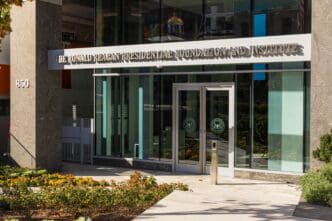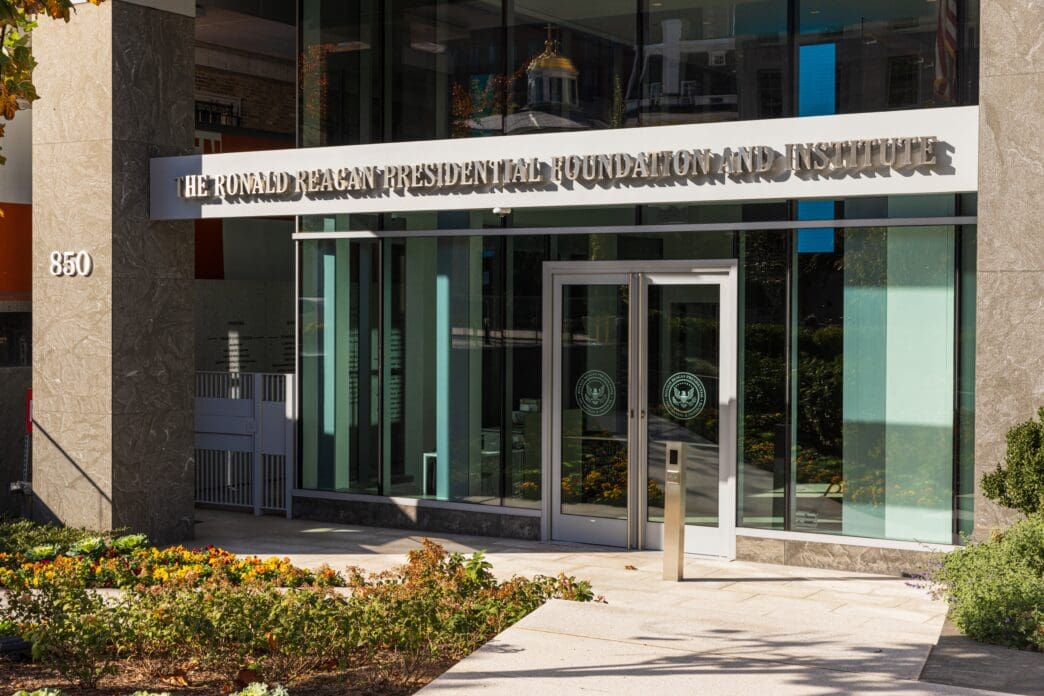Executive Summary
- The Ronald Reagan Presidential Foundation & Institute issued a statement appearing to distance itself from Ronald Reagan’s historical opposition to tariffs, in response to an Ontario ad campaign.
- The foundation’s statement provided a significant boost to President Trump’s pro-tariff agenda, which he swiftly capitalized on to call the Ontario ad “fake” and halt trade talks with Canada.
- Critics argue the foundation’s actions risk muddying the historical record of Reagan’s free trade advocacy and reflect a broader pattern of entities aligning with Trump’s agenda.
The Story So Far
- The controversy arises from a fundamental divergence between Ronald Reagan’s historical opposition to tariffs and President Donald Trump’s strong advocacy for them. The government of Ontario’s ad campaign, which used Reagan’s own words against protectionism to criticize Trump’s trade policies, prompted the Ronald Reagan Presidential Foundation & Institute to issue a statement that, while disputing the ad’s portrayal, inadvertently provided significant political leverage for Trump to push his pro-tariff agenda and claim a revised interpretation of Reagan’s economic philosophy.
Why This Matters
- The Reagan Foundation’s statement, by appearing to distance itself from Ronald Reagan’s historical opposition to tariffs, significantly bolstered President Trump’s protectionist trade agenda, enabling him to claim Reagan supported tariffs. This action not only provided ammunition for Trump but also highlights a broader trend of reinterpreting historical figures’ stances to align with current political narratives, potentially muddying the historical record and influencing the understanding of conservative economic principles.
Who Thinks What?
- The government of Ontario believes Ronald Reagan was a strong opponent of tariffs and trade wars, accurately using his own words in an ad campaign to highlight the dangers of protectionism.
- The Ronald Reagan Presidential Foundation & Institute claims Ontario’s ad uses “selective audio and video” that “misrepresents” Reagan’s address and is reviewing legal options for unauthorized use of his remarks.
- President Donald Trump asserts that Reagan “LOVED TARIFFS FOR OUR COUNTRY” and utilized the foundation’s statement to label Ontario’s ad as “fake” and justify halting trade talks with Canada.
The Ronald Reagan Presidential Foundation & Institute recently issued a statement that appeared to distance itself from Ronald Reagan’s historical opposition to tariffs, a move that analysts suggest provided a significant boost to President Donald Trump’s pro-tariff agenda. The statement came in response to an ad campaign by the government of Ontario, Canada, which used audio of Reagan decrying the dangers of tariffs and trade wars.
The Ontario government launched an extensive ad campaign targeting Trump’s tariffs, including a minute-long commercial featuring only Reagan’s voice. This ad, broadcast during World Series games, compiled comments from an April 1987 address in which Reagan spoke against protectionism and trade conflicts.
Shortly before 9 p.m. ET on Thursday, the Reagan Foundation released a statement accusing Ontario of using “selective audio and video” that “misrepresents” the former president’s address. The foundation also indicated it was “reviewing its legal options,” claiming Ontario did not seek or obtain permission to use Reagan’s remarks.
However, analysis of the situation suggests that these objections may not hold water. While the ad stitched together various comments, it accurately reflected Reagan’s stated views, which were consistent with his other public statements on tariffs and free trade during that period. Furthermore, government footage of presidents is generally considered public domain, and the Ronald Reagan Presidential Library had previously listed the clip of the 1987 address as “unrestricted” on YouTube.
Reagan’s general sentiments on trade policies were notably different from those expressed by Trump. Reagan often presented tariffs as a necessary evil and strongly warned against trade wars, while Trump has frequently lauded tariffs as “beautiful” and trade wars as “good” and “easy to win,” advocating them as vital for American manufacturing.
President Trump swiftly capitalized on the foundation’s statement, calling Ontario’s ad “fake” and claiming on social media that Reagan “actually … LOVED TARIFFS FOR OUR COUNTRY.” He further announced a halt to trade talks with Canada over the ads, thanking the Reagan Foundation for “exposing this FRAUD.”
This development is seen by some as a reflection of a broader pattern where entities and individuals, including some Republicans in Congress, appear to set aside established principles to align with or avoid conflict with President Trump’s agenda. Critics argue that the foundation’s actions risk muddying the historical record and potentially undermining the very ideals Reagan advocated for years.
Shifting Interpretations of Reagan’s Legacy
The incident highlights a tension in modern conservative orthodoxy regarding trade, particularly when juxtaposing Reagan’s historical statements with Trump’s policies. Even Trump and the White House have previously acknowledged differences, with a White House spokeswoman earlier this year listing tariffs as a key distinction between the two presidents’ agendas.
Trump himself claimed a year ago that he was “in a way more conservative than Reagan” due to his tariff policies. The Reagan Foundation’s recent statement, however, created an opening for Trump and his allies to suggest a revised interpretation of Reagan’s stance on trade, despite the extensive record of Reagan’s advocacy for free trade.
The foundation’s move, which seemed to cast doubt on the clarity of Reagan’s anti-tariff views, effectively provided ammunition for President Trump to push his trade policies, potentially at the expense of a consistent historical understanding of Reagan’s economic philosophy.








